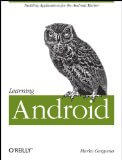I recently finished reading Learning Android. I have a Droid X, Mala has a Droid Eris, and I just bought a Viewsonic g-tablet, so I have plenty of Android devices. While I still have trouble with the idea of typing on a touchscreen, I know that we are moving towards a future where mobile devices are our primary computers. This is not earth shattering. Philip Greenspun mentioned it 5 years ago. Android will be one of the more prominent mobile OS’s along with iOS, so I want to learn how to program it.
I came into this book having browsed some of the example code on the developer.android.com website. It is great for an overview, and there is a lot of in-depth information on APIs, etc., but I still didn’t quite understand how to go about starting an app.
In March, O’Reilly had a sale on e-books, so I bought Learning Android. It is a reasonable introduction to Android programming. It’s beings gently, explaining the history of Android and providing a general overview of how the Android stack works. It’s explains how to use the Eclipse IDE, but as a fervent emacs fan, I was easily able to adjust to using emacs (with android-mode.el) for all of my development. There were typos and minor errors, but fortunately O’Reilly has an errata page where people can post fixes and suggestions. Keep that page open while you’re reading this book. There were a couple areas where the ordering of the discussion could have been improved. If I didn’t have that errata page at hand, I would have been completely frustrated. Especially at the beginning, the instructions were not detailed enough. For example, we are instructed on how to create a program and how to start the emulator, but there is no clear explanation on how to run the program on the emulator. A little more step-by-step hand-holding would have been nice.
In case you ignored my advice to check out that errata page, at least make sure that you have the updated version of the jTwitter library, or else you’ll never get the sample programs to run without errors.
I haven’t used Java in a while, so I forgot how verbose Java is. Writing Tcl, Ruby and Python has spoiled me. It takes so long to do something simple in Java. I know that this is usually offset by code generators and IDEs, but it still just seems so clunky to read and write. There is a scripting language project for Android (SL4A). I haven’t tried it, but it involves bundling the scripting environment with your app if you want to distribute it to others. I’m also not certain that it provides access to all of the functionality provided in the Java SDK. Someday, I hope that a scripting language SDK is provided. It seems like a natural progression.
All in all, I think Learning Android is perfect for someone who wants to get started in Android programming. It gives a nice gentle introduction to all of the basics of how the platform works. Most of this information is available on the web in various places, but it’s nice to have it all in one place, and I still think there’s value to having one book that takes you from step zero to a working app. I think I’ll now be able to use the online docs to get me moving. I was often frustrated by the typos, minor technical errors and inconsistencies, but I suspect the book was under a lot of time pressure, given how hot mobile programming is these days. It just felt like it was written on a rushed deadline. It’s also not the most entertaining book in the world, which is OK for a technical book. I’d always rather have a boring technical book, than an attempt at an entertaining one.
